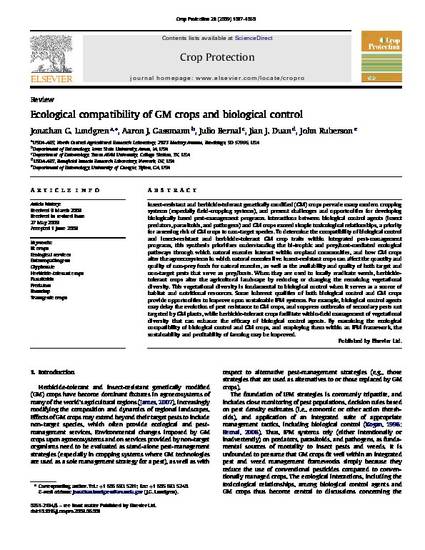
Insect-resistant and herbicide-tolerant genetically modified (GM) crops pervade many modern cropping systems (especially field-cropping systems), and present challenges and opportunities for developing biologically based pest-management programs. Interactions between biological control agents (insect predators, parasitoids, and pathogens) and GM crops exceed simple toxicological relationships, a priority for assessing risk of GM crops to non-target species. To determine the compatibility of biological control and insect-resistant and herbicide-tolerant GM crop traits within integrated pest-management programs, this synthesis prioritizes understanding the bi-trophic and prey/host-mediated ecological pathways through which natural enemies interact within cropland communities, and how GM crops alter the agroecosystems in which natural enemies live. Insect-resistant crops can affect the quantity and quality of non-prey foods for natural enemies, as well as the availability and quality of both target and non-target pests that serve as prey/hosts. When they are used to locally eradicate weeds, herbicide-tolerant crops alter the agricultural landscape by reducing or changing the remaining vegetational diversity. This vegetational diversity is fundamental to biological control when it serves as a source of habitat and nutritional resources. Some inherent qualities of both biological control and GM crops provide opportunities to improve upon sustainable IPM systems. For example, biological control agents may delay the evolution of pest resistance to GM crops, and suppress outbreaks of secondary pests not targeted by GM plants, while herbicide-tolerant crops facilitate within-field management of vegetational diversity that can enhance the efficacy of biological control agents. By examining the ecological compatibility of biological control and GM crops, and employing them within an IPM framework, the sustainability and profitability of farming may be improved.
Available at: http://works.bepress.com/aaron_gassmann/28/

This article is from Crop Protection 28 (2009): 1017, doi:10.1016/j.cropro.2009.06.001.